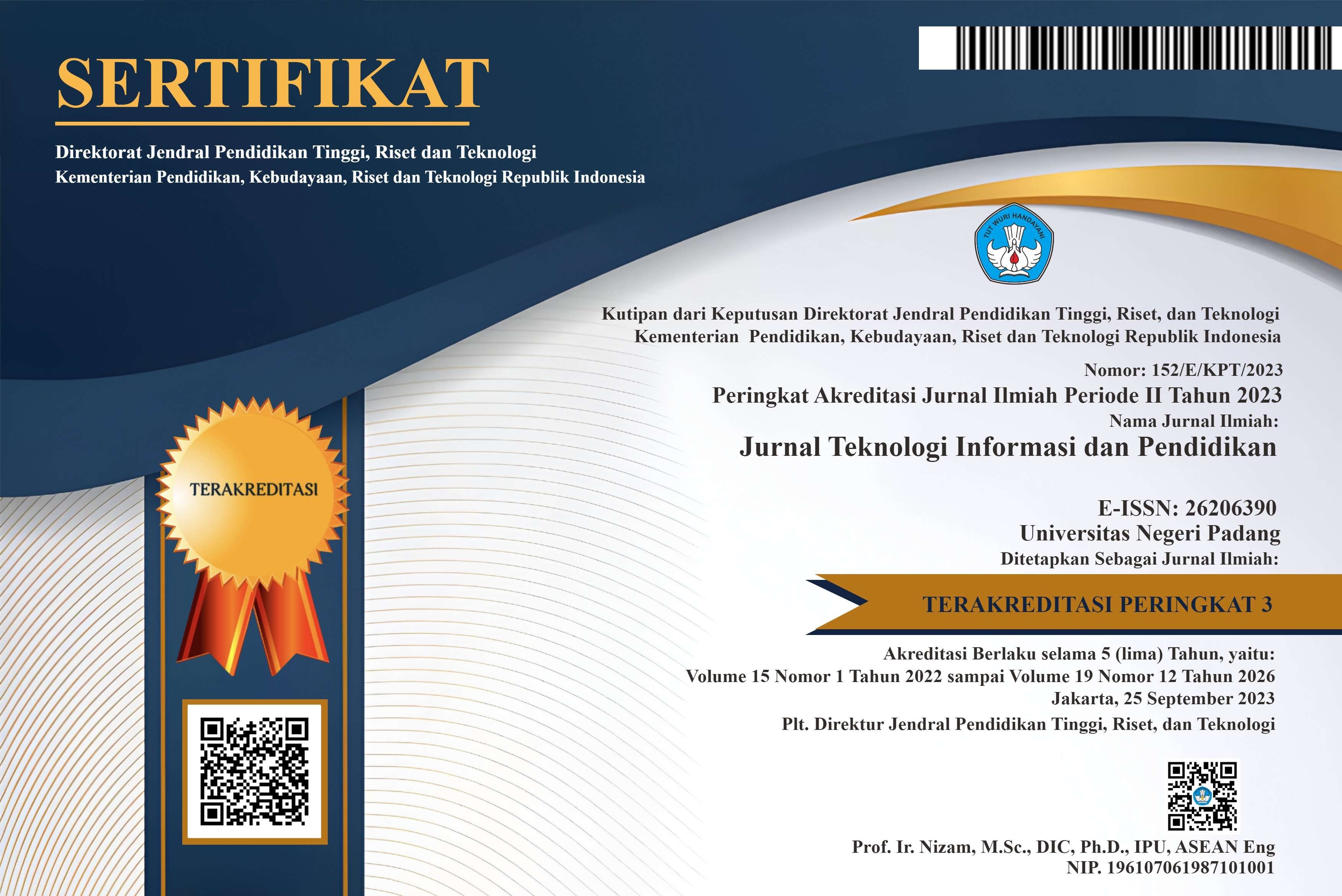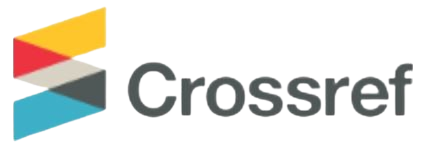Redesign User Interface (UI) and User Experience (UX) of Ikan Giling Segar Website with Design Thinking Method to Increase User Interest
Abstract
In this era, digital transformation in business is increasing. One of the businesses that participated in the transformation and was studied in this research is Sabrina Store, which sells groundfish through its website, Ikan Giling Segar. Even so, challenges arise related to website design that is not optimal. This research is included in the Research and Development (R&D) research type. It uses design thinking methods to improve the appearance of the website design so that user interest also increases. Data were collected through questionnaires and related literature. Pre-questionnaires and questionnaires were conducted after the redesign using the User Experience Questionnaire (UEQ) method with respondents from potential users in East Java, as well as usability testing of the redesigned prototype. Results showed that five aspects of UEQ were below average before the redesign. However, after the redesign, all aspects improved. Usability and UEQ testing also showed that the redesign improved user interest and experience. Thus, using design thinking and R&D methods can provide holistic solutions to improve the UI / UX of online business websites with positive results.
References
Badan Pusat Statistik, “Statistik E-Commerce 2022/2023,” pp. 1–144, 2023, [Online]. Available: https://www.bps.go.id/id/publication/2023/09/18/f3b02f2b6706e104ea9d5b74/statistik-ecommerce-2022-2023.html
R. Li, J. Rao, and L. Wan, “The digital economy, enterprise digital transformation, and enterprise innovation,” Manag. Decis. Econ., vol. 43, no. 7, 2022, doi: 10.1002/mde.3569.
D. D. Pane et al., Blue Economy Development Framework for Indonesia’s Economic Transformation, vol. 1, no. 2. 2021.
C. M. Annur, “Konsumsi Ikan di Indonesia Naik pada 2022, Tertinggi Sedekade Terakhir.” Accessed: Jan. 10, 2024. [Online]. Available: https://databoks.katadata.co.id/datapublish/2023/07/07/konsumsi-ikan-di-indonesia-naik-pada-2022-tertinggi-sedekade-terakhir
Badan Pusat Statistik, “Statistik E-Commerce 2022,” vol. 5, no. 1, pp. 1689–1699, 2022, [Online]. Available: https://www.bps.go.id/id/publication/2022/12/19/d215899e13b89e516caa7a44/statistik-e-commerce-2022.html
I. Ayesha et al., Digital Marketing (Tinjauan Konseptual). 2022.
W. Utomo, “Modul Tutorial E-Commerce,” Repository.Unkris.Ac.Id, 2020.
H. W. Aripradono and M. Ardiansyah, “Analisa Pengaruh Kualitas Desain Website Terhadap Minat Beli Online Travel Agent,” J. Inf. Syst. Technol., vol. 4, no. 1, pp. 333–345, 2023, doi: 10.37253/joint.v4i1.6331.
J. Yablonski, “Laws of UX Using Psychology to Design Better Products & Services.”
D. N. Puspitaningrum, I. Perdana, and N. I. Utama, “Redesign Ui/Ux Website Open Library Telkom University Berdasarkan Tipe Kepribadian Influence Dengan Metode Design Thinking,” J. Indones. Manaj. Inform. dan Komun., vol. 4, no. 3, pp. 1874–1886, 2023, doi: 10.35870/jimik.v4i3.425.
A. L. Maheswari and K. Krisnanik, “Analisis User Experience dan Redesign AntarmukaWebsite Elsam Dengan Metode User ExperienceQuestionnaire (UEQ),” J. Sist. Inf. dan Apl., vol. 1, no. 1, pp. 1–15, 2023.
A. I. Islami and E. Krisnanik, “ANALISIS USER EXPERIENCE DAN REDESIGN USER INTERFACE WEBSITE BTA GROUP DENGAN METODE USER EXPERIENCE QUESTIONNAIRE (UEQ),” in Prosiding Seminar Nasional Mahasiswa Bidang Ilmu Komputer dan Aplikasinya, 2023, pp. 1–11.
N. Yolanda and F. Rizal, “Website Based E-Module Development on Computer System Vocational High School 1 Painan,” J. Teknol. Inf. dan Pendidik., vol. 14, no. 1, pp. 40–46, 2021, doi: 10.24036/tip.v14i1.417.
R. Yulius, M. F. A. Nasrullah, D. K. Sari, and M. A. Alban, “Design Thinking: Konsep dan Aplikasinya,” Eureka Media Aksara, pp. 1–74, 2022.
M. Meinel, T. T. Eismann, C. V. Baccarella, S. K. Fixson, and K. I. Voigt, “Does applying design thinking result in better new product concepts than a traditional innovation approach? An experimental comparison study,” Eur. Manag. J., vol. 38, no. 4, pp. 661–671, 2020, doi: 10.1016/j.emj.2020.02.002.
A. M. Wijayanto, A. Triayudi, and A. Rubhasy, “Penerapan Metode Design Thinking Dalam Rancang Aplikasi Penanganan Laporan Pencurian Barang Berharga Di Polsek Sukmajaya,” JIPI (Jurnal Ilm. Penelit. dan Pembelajaran Inform., vol. 6, no. 2, pp. 267–276, 2021, doi: 10.29100/jipi.v6i2.2026.
M. Schrepp, “User Experience Questionnaire Handbook v10(03.05.2023),” URL https//www. Res. net/publication/303880829{_}User{_}Experience{_}Questionnaire{_}Handbook{_}Version{_}2.(Accessed 02.02. 2017), pp. 1–16, 2023, [Online]. Available: www.ueq-online.org
K. Karina and D. Pibriana, “Penggunaan Metode User Experience Questionnaire Untuk Menganalisis Kualitas Pengalaman Pengguna Aplikasi Myindihome Mobile,” METHOMIKA J. Manaj. Inform. dan Komputerisasi Akunt., vol. 7, no. 1, pp. 10–19, 2023, doi: 10.46880/jmika.vol7no1.pp10-19.
R. Budiu and K. Moran, “How Many Participants for Quantitative Usability Studies: A Summary of Sample-Size Recommendations.” Accessed: Jan. 31, 2024. [Online]. Available: https://www.nngroup.com/articles/summary-quant-sample-sizes/.
S. Guay, L. Rudin, and S. Reynolds, “Testing, testing: a usability case study at University of Toronto Scarborough Library,” Libr. Manag., vol. 40, no. 1–2, pp. 88–97, 2019, doi: 10.1108/LM-10-2017-0107.
W. Andriyan, S. S. Septiawan, and A. Aulya, “Perancangan Website sebagai Media Informasi dan Peningkatan Citra Pada SMK Dewi Sartika Tangerang,” J. Teknol. Terpadu, vol. 6, no. 2, pp. 79–88, 2020, doi: 10.54914/jtt.v6i2.289.
F. Febrianto and W. Andhika, “Penggunaan Metode User Persona dalam Upaya Penambahan Kebutuhan Fitur Learning Management System,” J. Syntax Admiration, vol. 2, no. 7, 2021, doi: 10.46799/jsa.v2i7.274.
A. Rachman, B. S. Salim, A. Sodik, J. Iswanto, A. R. Vanchapo, and M. A. Manuhutu, “Pemodelan User Interface dan User Experience Menggunakan Design Thinking,” vol. 7, no. 2, pp. 9281–9289, 2023, [Online]. Available: https://www.jptam.org/index.php/jptam/article/view/7807/6426
A. Prehanto, G. C. Aprilia, R. G. Guntara, H. P. Indradi, and S. Kova, The Application of Android-Based Business English Learning Module. Atlantis Press SARL, 2023. doi: 10.2991/978-2-38476-060-2_19.
Thamrin, Ambiyar, W. Simatupang, and R. Wahyudi, “Heuristic Evaluation on Interface of Thesis Management Information System in Vocational Environment,” vol. 16, no. 2, 2023.
M. G. Sidiqi, R. G. Guntara, and O. Herdiana, “Indonesian Journal of Digital Business The Evaluation of User Experience UPI Digital Business Website with Usability Testing Method and System Usability Scale,” vol. 4, no. May, pp. 1–9, 2021.
A. F. Yogananti and D. I. Ihya’ Ulumuddin, “College Student’s Perception toward ‘ Peduli Lindungi’ Application through the Usability Scale Method,” J. Teknol. Inf. dan Pendidik., vol. 15, no. 2, pp. 73–83, 2023, doi: 10.24036/jtip.v15i2.623.
A. B. Sayeti, A. Fauzi, D. F. Irawan, and ..., “FAKTOR-FAKTOR YANG MEMPENGARUHI MINAT PENGGUNA APLIKASI ONLINE SHOP: KELENGKAPAN, KENYAMANAN, KUALITAS DAN KEMUDAHAN (STUDI …,” … Sist. Inf., 2022.
Copyright (c) 2024 Jurnal Teknologi Informasi dan Pendidikan

This work is licensed under a Creative Commons Attribution-ShareAlike 4.0 International License.















.png)














